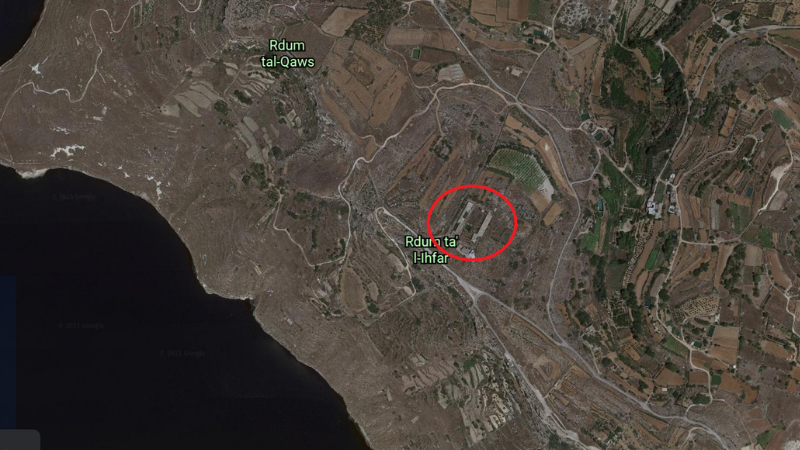In a rare decision, the Planning Board of the Planning Authority today turned down a controversial development application to turn an ODZ abandoned explosives factory in a remote, Natura 2000 area in Dingli into a tourism development.
The decision is in line with the PA’s consistent refusal to issue permits for projects proposed for the site over the past two decades.
The decision, which went against the PA planning directorate’s own recommendation that a permit be granted, was taken in a public vote supported by Chairman Vince Cassar, ERA Chairman Victor Asciak and members Annick Bonello, Duncan Mifsud, Savior Debono Grech, Omar Vella, and the Dingli Local Council.
All the voting members agreed that despite the PA directorate’s insistence that this development “would be better than what there exists at the moment”, the planned development was objectionable and will be against the interests of the environment.
Ignoring hundreds of written objections to the application, Case Officer Mark Caruana, supported by the PA’s government-appointed Chairman Martin Saliba, staunchly defended the directorate’s recommendation.

Martin Saliba was appointed Planning Authority chairman by Minister Ian Borg.
While they insisted the permit to turn the former factory into 14 holiday homes should be granted, the two officials faced sharp criticism during the meeting, with opponents pointing out that the proposed development was a non-starter as the site lies within a Natura 2000 site – the highest protection an area can have.
Although the original factory permit, issued in 1987, was issued on specific conditions that the Pulvich explosives factory would not be turned into any future tourism and holiday accommodation, Saliba – appointed to his post by Minister Ian Borg – argued for the reversal of this condition, claiming that in 1987 it “was a standard condition issued at the time and is not valid to this application”.
“The condition was applicable to the building hosting a factory. Now this factory is going to be pulled down and a new development will take place. This means that the 1987 condition does not apply any longer,” Saliba stated.
Multiple objections were raised during the discussion, with Din l-Art Helwa, Ramblers, Birdlife, Graffiti and many others who vehemently opposed the permit, stating that this is completely against all polices to the Natura 2000 site, Saliba persisted in defending the development.
“The development will definitely be much better than what is currently on site,” he said, while insisting that “it will have even an economic benefit for Dingli,” citing as one of the reasons, an existing restaurant on the Dingli cliffs.
The restaurant cited by Saliba is also a matter of controversy in Dingli, with many rumours surrounding its ‘real’ ownership and questioning how a supposed interpretation centre financed by EU funds during the time of Minister Ian Borg’s mayorship of the quaint village was suddenly turned into a restaurant.
An application shrouded in mystery
This rejected application was the latest in a series put forward by the Puglisevich family from Dingli over the past 20 years to turn their unused land into a new business venture.
The PA had already turned down numerous applications on the site, ranging from a storage facility to residential bungalows and a SPA hotel.
While in the last few years the Dingli family appeared to have lost hope of ever getting development permissions for their abandoned ODZ factory, their interest was revived soon after Ian Borg – also a Dingli resident – became Minister responsible for the PA in 2017.
As new development applications started being filed at the PA, Infrastructure Malta – also falling under Minister Borg’s political wing – began paying particular attention to the remote area.
A €350,000 heavy duty water pipeline, leading exactly to outside the Pulvich factory’s permitter was rapidly installed while all the roads leading to the rural area were re-built and covered with fresh tarmac.
Also, EU funds were obtained to finance the building of new high new rubble walls along the rural roads in the area, blocking long distance vistas overlooking the ‘explosives factory’.
Although all these works raised eyebrows among Dingli residents, who began to suspect that something was brewing at the ‘explosives factory’, Infrastructure Malta always insisted that its works had nothing to do with the pending development application.
The public works carried over the past two years are now being scrutinised by two separate magisterial inquiries after reports of possible abuse of taxpayers funds.













Għal darba, aħbar tajba.
EU funds wasted on dreams for some to get rich quick.
Couldn’t those funds be utilized in residential areas elsewhere which are badly lacking in properly surfaced roads – so many streets in Sliema come to mind!
The real news from today’s Planning Board (PB) hearing was not exactly the declaration of the intention of a majority of the PB members to vote against Application PA/05257/20 for the development of 14 residential bungalows with accommodation for 68 persons, a communal pool, and a “Management Block” housing an area with tables, chairs and a “breakfast table” on the highly protected Dingli Cliffs. An investment with an estimated market value of 15 to 30 million Euros. And it wasn’t the PB’s agreement to postpone their final decision to another date, giving the Applicant’s Architect the time to come up with some tweaks to justify a possible favourable final decision, either. The defence of the Application by the Case Officer and Mr. Martin Saliba, the Executive Chairman of the “independent” Planning Authority appointed by Ian Borg before the latter was unceremoniously removed from Planning Minister was already more newsworthy than the sum total of the PB’s decisions taken today.
Yet, the climax of today’s PB hearing was when PB Chairman Perit Vince Cassar turned to the Applicant’s Architect to ask him some questions.
“Where is the pool pump room located?” came his warning missile. Sure enough, the Applicant’s Architect was taken by surprise, and could only admit that he did not know, and that the project Engineer was not present. I later checked the most recent block plan of the Application (document 600a) and could not find a pool pump room anywhere on the drawing of the entire 6,000 squared meters of the proposed project, despite there being one 90-something squared meters communal pool.
Then came Perit Cassar’s high precision torpedo. “The whole complex will depend on the cesspool, and that’s a lot of volume (of shit) for one cesspool. Surely this will have to be emptied daily,” is an approximation of his question.
And before the Applicant’s Architect could reach for some papers, which did not contain the answer, the PB Chairman clarified that he was referring to the cesspool at the entrance of the complex, which the Architect had just painted like a corner of heaven on the Dingli Cliffs.
The Applicant’s Architect gave what appeared to be an off the top of his head answer, saying it would have to be emptied every three days or so.
It was at this point that you could see the Application sink into the cesspool.
A high class tourism complex indeed. With a pool without a water pump, and a cesspool welcoming you at the entrance, and the spectacle of it being emptied on Monday, Thursday and Sunday.
That was the real news from the PB today.